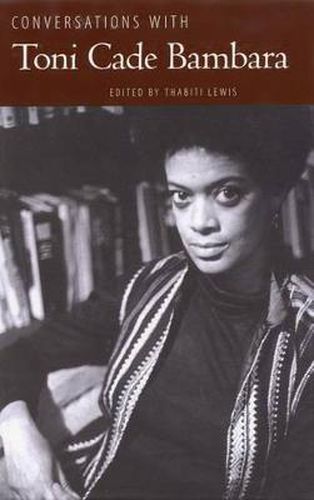Readings Newsletter
Become a Readings Member to make your shopping experience even easier.
Sign in or sign up for free!
You’re not far away from qualifying for FREE standard shipping within Australia
You’ve qualified for FREE standard shipping within Australia
The cart is loading…






Conversations with Toni Cade Bambara reveals an artist and activist whose work deftly negotiates boundaries of feminism, nationalism, and film. The intimacy of these collaborations or conversations between Bambara (1939-1995) and her interviewers provide an excellent and necessary resource for those interested in scholarly approaches to her fiction, especially her novels The Salt Eaters (1980) and the posthumously published Those Bones Are Not My Child (1999), and her acclaimed short story collection Gorilla, My Love. The collection reveals the passion, humor, and real-life experiences of the woman whoBthrough her editing of the groundbreaking anthology of black women=s writing The Black Woman (1970) and contributions to the documentary W.E.B. Du Bois: A Biography in Four VoicesBchanged perceptions of African American culture in the modern era. The interviews present a woman that saw herself as
a teacher who writes, a social worker who writes, a youth worker who writes, a mother who writes.
Bambara viewed herself as a cultural worker for oppressed people whose job as an artist was making, in her words,
revolution irresistible.
Indeed, her fiction champions the working class and
average folk,
both of whom she felt were made invisible by mainstream American society. The volume also displays Bambara=s passionate criticism of radicalism and revolutionary philosophies that were structured by patriarchal, sexist, and heterosexual-centric paradigms. Her willingness to challenge her own ideals, as well as those that conflicted with them, marks her as one of the most forceful black writers of her era.
$9.00 standard shipping within Australia
FREE standard shipping within Australia for orders over $100.00
Express & International shipping calculated at checkout
Conversations with Toni Cade Bambara reveals an artist and activist whose work deftly negotiates boundaries of feminism, nationalism, and film. The intimacy of these collaborations or conversations between Bambara (1939-1995) and her interviewers provide an excellent and necessary resource for those interested in scholarly approaches to her fiction, especially her novels The Salt Eaters (1980) and the posthumously published Those Bones Are Not My Child (1999), and her acclaimed short story collection Gorilla, My Love. The collection reveals the passion, humor, and real-life experiences of the woman whoBthrough her editing of the groundbreaking anthology of black women=s writing The Black Woman (1970) and contributions to the documentary W.E.B. Du Bois: A Biography in Four VoicesBchanged perceptions of African American culture in the modern era. The interviews present a woman that saw herself as
a teacher who writes, a social worker who writes, a youth worker who writes, a mother who writes.
Bambara viewed herself as a cultural worker for oppressed people whose job as an artist was making, in her words,
revolution irresistible.
Indeed, her fiction champions the working class and
average folk,
both of whom she felt were made invisible by mainstream American society. The volume also displays Bambara=s passionate criticism of radicalism and revolutionary philosophies that were structured by patriarchal, sexist, and heterosexual-centric paradigms. Her willingness to challenge her own ideals, as well as those that conflicted with them, marks her as one of the most forceful black writers of her era.